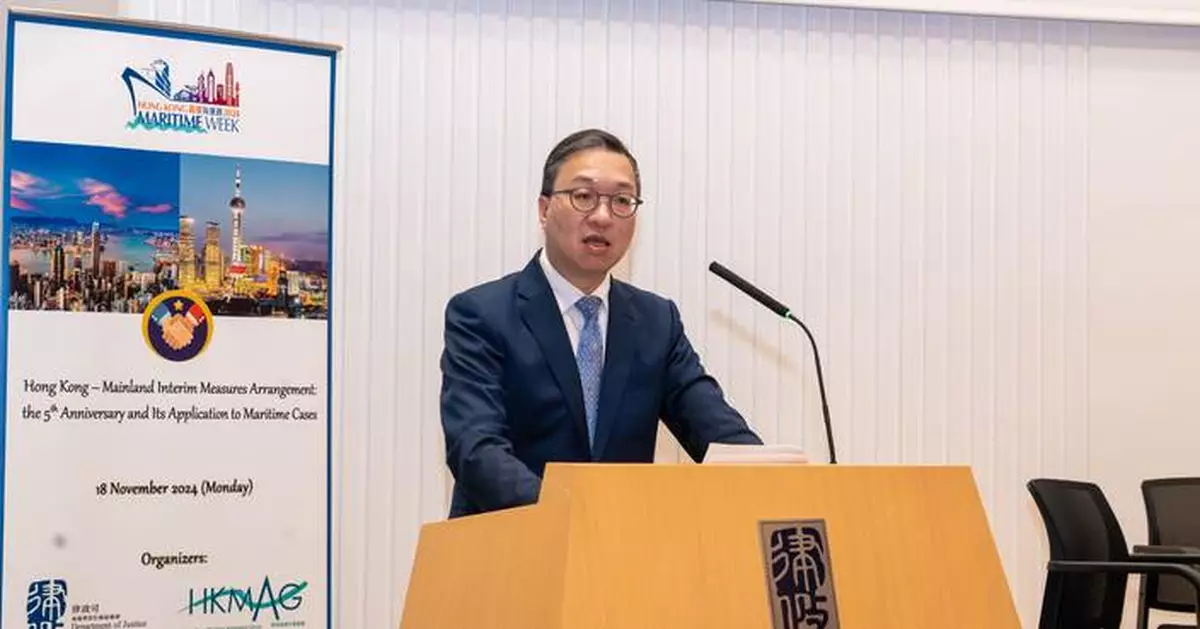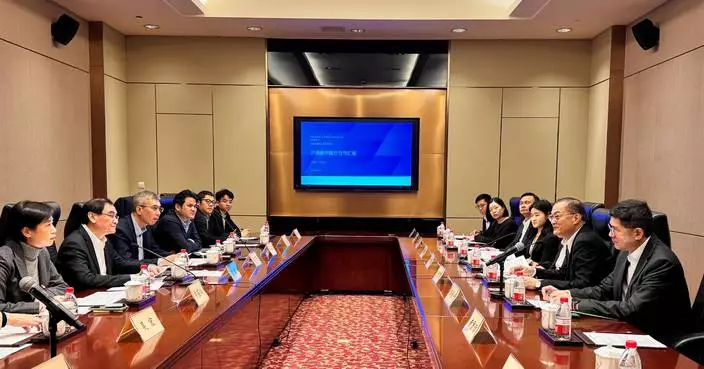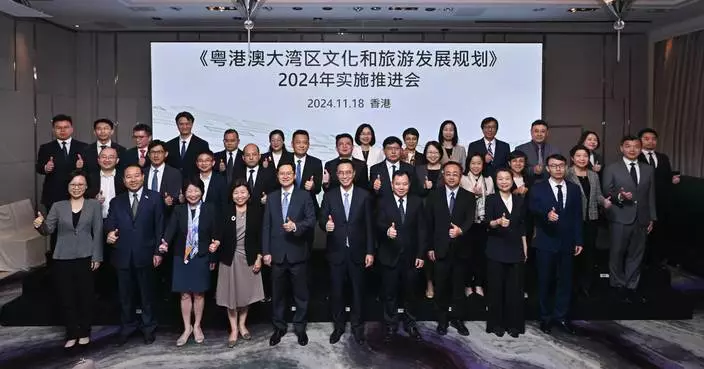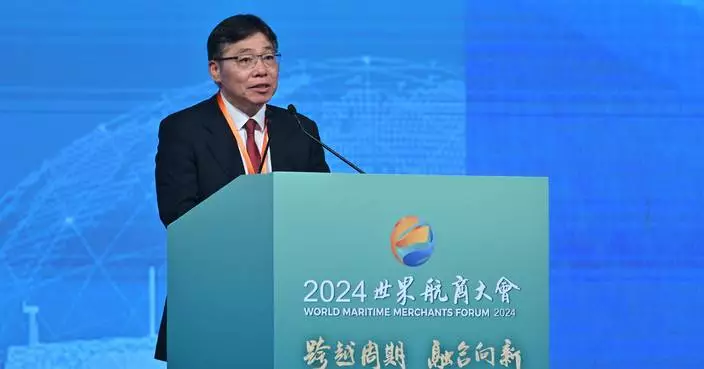Speech by SJ at seminar on "Hong Kong - Mainland Interim Measures Arrangement: the 5th Anniversary and Its Application to Maritime Cases" of Hong Kong Maritime Week 2024
Following are the opening remarks by the Secretary for Justice, Mr Paul Lam, SC, at the seminar on "Hong Kong - Mainland Interim Measures Arrangement: the 5th Anniversary and Its Application to Maritime Cases" of Hong Kong Maritime Week 2024 today (November 18):
Mr Mok (President of the Hong Kong Maritime Arbitration Group, Mr Danny Mok), Judge Yao (Deputy Chief Judge of Ningbo Maritime Court Zhoushan Tribunal, Ms Nina Yao), Judge Ni (Director of Research Center of Guangzhou Maritime Court, Mr Ni Xuewei), distinguished guests, ladies and Gentlemen,
Good morning, it is my great pleasure to meet you all here. Today is the second day of Hong Kong Maritime Week 2024, and as we celebrate the fifth anniversary of the Interim Measures Arrangement (Arrangement Concerning Mutual Assistance in Court-ordered Interim Measures in Aid of Arbitral Proceedings by the Courts of the Mainland and of the Hong Kong Special Administrative Region) this year, this gives us a timely and special occasion to delve into the implementation of the Arrangement and its application to maritime cases.
We are also very happy to be joined by judges from the Mainland maritime courts as well as practitioners from Hong Kong and the Mainland, who will later share their unique insights in handling interim measures cases under the Arrangement.
Overview of the Arrangement
Interim measures are temporary reliefs that may be granted before the final resolution of a dispute, with the aim to preserve the status quo, protect evidence, or prevent dissipation of assets while the proceedings are ongoing. Therefore, the availability of urgent interim measures is vital to the effective dispute resolution process, as it provides parties with timely access to justice so as to secure the fruits of the pending proceedings.
Hong Kong, as a jurisdiction adopting the UNCITRAL Model Law, has long allowed the provision of interim measures from the courts in aid of arbitration proceedings both in and outside Hong Kong, and that of course include those conducted on the Mainland. However, in contrast, the legal framework on the Mainland did not generally permit the Mainland courts to grant similar reliefs in support of arbitration seated outside the Mainland. Why do I say "generally"? As some of you would probably know, there is a very narrow exception to the general rule, where only the Mainland maritime courts can grant preservation measures in aid of foreign-seated arbitration over four specified types of maritime assets, namely ships, cargo carried by a ship, ship fuel and ship materials. The types of assets that can be preserved in maritime injunction are very limited, and do not cover other more common assets such as bank cash, shares, bonds and real property.
To fill the lacuna and strengthen the mutual assistance framework between the Mainland and Hong Kong on arbitration, the Supreme People's Court and the Department of Justice (DoJ) had engaged in rounds of discussion since 2018. The Interim Measures Arrangement was finally signed in April 2019.
As a groundbreaking initiative, the Arrangement allows parties in Hong Kong-seated arbitral proceedings that are administered by qualified arbitral institutionsto apply for interim measures from Mainland Courts, whether before the commencement of the arbitration or during the arbitration proceedings. The scope of interim measures allowed are very wide, including the preservation of property, evidence and conduct.
The Arrangement is also reciprocal in that it allows parties to arbitral proceedings in Mainland China to apply to the Hong Kong courts for interim measures. In effect, the current legal position under Hong Kong law concerning the court's issuance of interim measures remains unchanged.
Effectiveness of the Arrangement
The Arrangement is often described as a "game changer", and I believe this is no exaggeration. Up to date, Hong Kong is the first and, so far, the only common law jurisdiction outside the Mainland where interim measures applications to the Mainland courts are possible. Over the past five years, the Arrangement has proven to be very effective to the conduct of arbitration across the two places.
First, it has been widely used. Let me quote some statistics and let the numbers speaks for themselves. As at September this year, 145 applications were made to 50 Mainland Courts for interim measures, and the total value of assets preserved amounted to around RMB21 billion.
Second, applications made under the Interim Measures Arrangement have been handled by the Mainland Courts in an expeditious and timely manner. A vivid example is the first application made under the Arrangement, which has set an excellent precedent for implementation. It was an application for property preservation arising from an alleged breach of a settlement agreement in a charterparty dispute. The preservation order was issued on the very same day of the application. Similarly, in a case recently handled by the Beijing Financial Court, the preservation sum was huge, amounting to more than RMB100 million and involving 16 bank accounts, land properties and shares with multiple parties. The Court swiftly formed a collegial panel to conduct the proceedings and deliberation through its "midnight court" mechanism, and it took only three days from case filing to the issuance of a ruling.
Third, flexible measures have been adopted by the Mainland Courts to support the implementation of the Arrangement and cater for the needs of the parties. For example, in a case handled by Suzhou Intermediate People's Court during the pandemic, the Court noted the logistical inconvenience of transferring supporting documents across the border and had flexibly conducted verification with the administering Hong Kong arbitral institution by way of email. The preservation order was granted only after one week of the application, and the final arbitral award dealing with the substantive dispute in that case was also subsequently recognised and enforced by the same Court. In view of the high efficiency of processing interim measures application, this case is recorded in one of the summary of six landmark cases published on the Supreme People's Court's website two months ago.
Fourth, to echo the theme of today's Seminar, the application of the Arrangement is very wide covering all types of commercial disputes including maritime disputes. And the types of assets that can be preserved under the Arrangement are basically everything, which extend well beyond the four limited categories of ship-related assets which I mentioned earlier. For example, the very first application under the Arrangement was indeed related to maritime disputes, and the applicant successfully sought to preserve the cash held in the respondent's bank account. Similarly, in a Hong Kong arbitration concerning the breach of voyage charter contract for transporting coal, Wuhan Maritime Court had ordered to freeze the bank accounts as an interim relief. From these cases, we would see that the preservation measures would not have been possible but for the Arrangement, and the Arrangement has brought unparalleled practical convenience to Hong Kong arbitration users in all commercial sectors, including, of course, the maritime industry.
Some practical insights regarding the Arrangement
To make the most of the Arrangement, I would like to share some practical tips, which may be helpful to arbitration users and practitioners. Since the implementation of the Arrangement, over the past five years, most applications for interim measures have been granted, and we understand only seven applications were unsuccessful, which is a very small number. It came to our notice that one of the applications for property preservation was unsuccessful, because the arbitration concerned was an ad hoc arbitration and thus could not take advantage of the Interim Measures Arrangement. Thus, if parties foresee the need to seek interim relief from the Mainland courts, the rule of thumb is to choose Hong Kong as the seat of arbitration and appoint a qualified Hong Kong arbitral institution to administer the proceedings.
At present, there are seven designated Hong Kong arbitral institutions under the Arrangement, and our co-organiser of this Seminar, the Hong Kong Maritime Arbitration Group (HKMAG), is one of them and also with a unique focus on maritime arbitration. By the end of this year, the DoJ will launch a new round of open application for designation, and we very much welcome new applications from other eligible Hong Kong arbitration institutions.
It is equally important to go to the right Mainland Court. The Arrangement expressly provides that applications should be made to the Mainland Intermediate People's Court where the respondent resides or where the property or evidence is situated. In fact, a previous interim measure application was denied on the ground that it was made to an incorrect Mainland Court which has no jurisdiction on the assets concerned.
Other than that, the application process is fairly straightforward, and the Arrangement has set out in detail the materials and information required in support of the application. Applicants may also make reference to the sample court document templates available on the DoJ's website.
Concluding remarks
Reflecting on the past five years, the Arrangement has transformed the landscape of arbitration between the Mainland and Hong Kong and has provided greater legitimacy and efficiency to the cross-border arbitration process. The DoJ will continue the efforts to foster a conducive environment for dispute resolution.
On this note, I am happy to share a new liberalisation measure announced by the Central People's Government last month. Amendments have been made to CEPA to support Hong Kong-invested enterprises registered in the pilot municipalities of the Mainland to agree to adopt Hong Kong law as applicable law in their contracts, and also to support Hong Kong-invested enterprises registered in the nine Pearl River Delta municipalities of the Greater Bay Area to agree to choose Hong Kong as the seat of arbitration. The facilitation measure well signifies the trust placed on Hong Kong as the seat of arbitration, and would also provide greater flexibility and convenience for Hong Kong enterprises.
Lastly, my sincere thanks to the HKMAG for co-organising this meaningful seminar, and I look forward to hearing all the practical and valuable insights from our renowned speakers. May I close by wishing you all a fruitful discussion, and smooth sailing. Thank you.
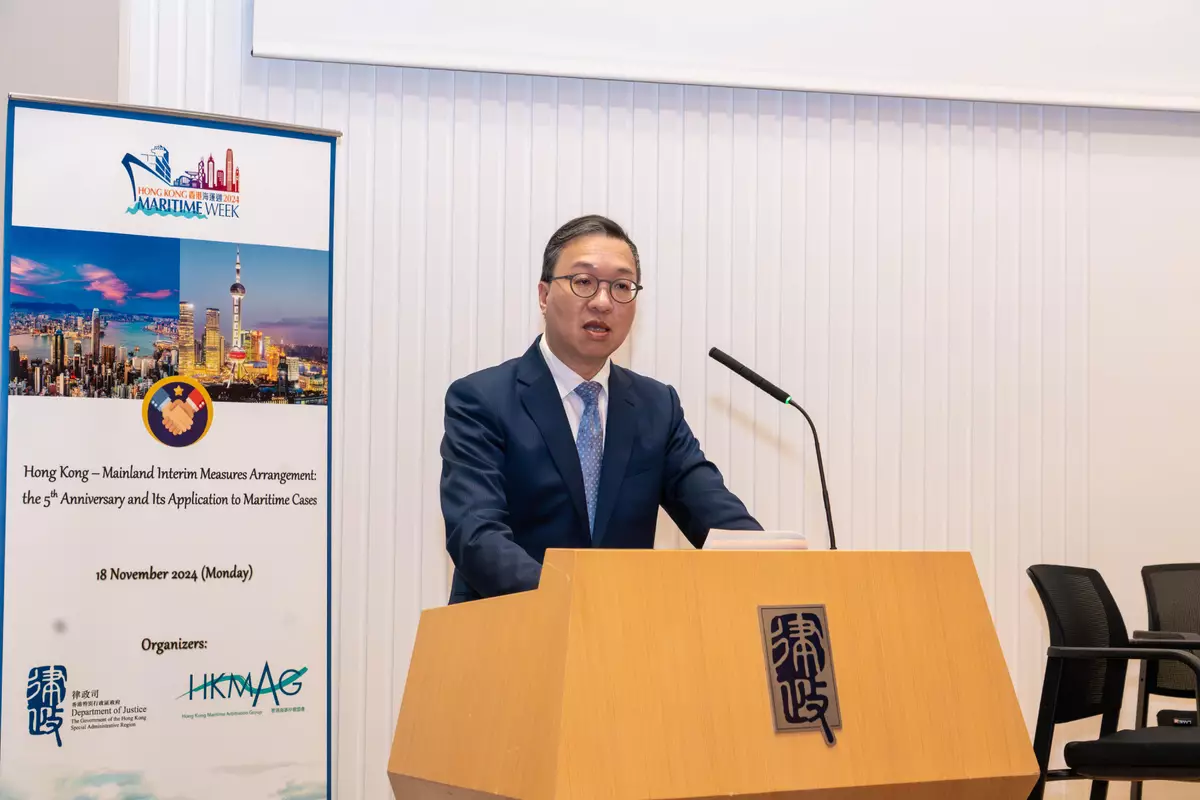
Speech by SJ at seminar on "Hong Kong - Mainland Interim Measures Arrangement: the 5th Anniversary and Its Application to Maritime Cases" of Hong Kong Maritime Week 2024 Source: HKSAR Government Press Releases


